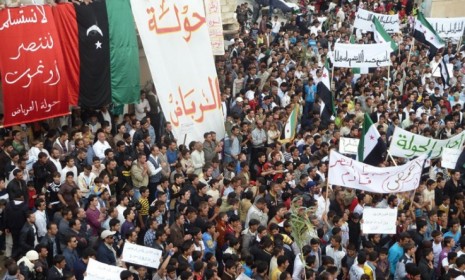Can the Arab League contain Syria?
President Bashar al-Assad's regime reportedly agrees to a deal to end its deadly crackdown on protesters. But can Assad be trusted?

A free daily email with the biggest news stories of the day – and the best features from TheWeek.com
You are now subscribed
Your newsletter sign-up was successful
Syria and the 22-nation Arab League have reportedly reached an agreement that aims to end nearly eight months of civil unrest. Arab League diplomats have called on the regime of President Bashar al-Assad to stop all violence against pro-democracy demonstrators, remove its tanks from the streets, and release political prisoners. Details remain scant on how exactly Syria has agreed to comply with those demands. But after a crackdown that the United Nations says has killed 3,000 people, is there really any hope Assad will back down in the name of peace?
No. Assad can't be trusted: "There may be no alternative to civil war," says Britain's Guardian in an editorial. Syria won't know peace until "Assad sees that he is finished, and that his only hope of survival is to agree to a transitional government and free elections." He often promises reform to unhappy allies — first Turkey, then Saudi Arabia, and now the Arab League. But he never delivers.
"Syria: Delaying the inevitable"
The Week
Escape your echo chamber. Get the facts behind the news, plus analysis from multiple perspectives.

Sign up for The Week's Free Newsletters
From our morning news briefing to a weekly Good News Newsletter, get the best of The Week delivered directly to your inbox.
From our morning news briefing to a weekly Good News Newsletter, get the best of The Week delivered directly to your inbox.
Assad defies the Arab League at his own risk: "No doubt Syria will try to bamboozle the League," says Trudy Rubin at The Philadelphia Inquirer. And in the old days it might have worked. But the Arab League has changed in the wake of the Arab Spring, as it showed by taking a tough stand against Moammar Gadhafi that paved the way for the no-fly zone and his ultimate demise. If Assad doesn't accept a ceasefire and stick to it, he may regret it.
"Arab autumn emerges, with a new Mideast"
This deal might be Assad's last hope: "To go on with killing protesters and bombing cities is a recipe for self-annihilation," says Osama al Sharif at Saudi Arabia's Arab News. Assad's strategy of denial and violence is creating more and more opposition to his regime abroad. And at home, it's driving disgusted, and armed, soldiers into the protesters' camp. Bowing to the Arab League's demands and accepting a "peaceful and democratic transition of power" could be his last chance for "an honorable exit."
A free daily email with the biggest news stories of the day – and the best features from TheWeek.com